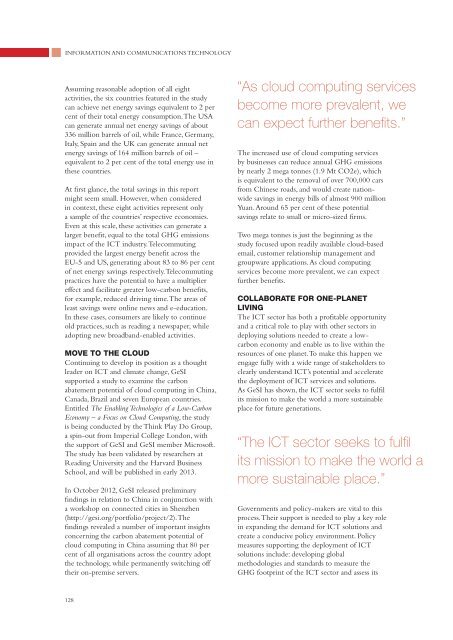Climate Action 2012-2013
You also want an ePaper? Increase the reach of your titles
YUMPU automatically turns print PDFs into web optimized ePapers that Google loves.
INFORMATION AND COMMUNICATIONS TECHNOLOGY<br />
Assuming reasonable adoption of all eight<br />
activities, the six countries featured in the study<br />
can achieve net energy savings equivalent to 2 per<br />
cent of their total energy consumption. The USA<br />
can generate annual net energy savings of about<br />
336 million barrels of oil, while France, Germany,<br />
Italy, Spain and the UK can generate annual net<br />
energy savings of 164 million barrels of oil –<br />
equivalent to 2 per cent of the total energy use in<br />
these countries.<br />
At first glance, the total savings in this report<br />
might seem small. However, when considered<br />
in context, these eight activities represent only<br />
a sample of the countries’ respective economies.<br />
Even at this scale, these activities can generate a<br />
larger benefit, equal to the total GHG emissions<br />
impact of the ICT industry. Telecommuting<br />
provided the largest energy benefit across the<br />
EU-5 and US, generating about 83 to 86 per cent<br />
of net energy savings respectively. Telecommuting<br />
practices have the potential to have a multiplier<br />
effect and facilitate greater low-carbon benefits,<br />
for example, reduced driving time. The areas of<br />
least savings were online news and e-education.<br />
In these cases, consumers are likely to continue<br />
old practices, such as reading a newspaper, while<br />
adopting new broadband-enabled activities.<br />
MOVE TO THE CLOUD<br />
Continuing to develop its position as a thought<br />
leader on ICT and climate change, GeSI<br />
supported a study to examine the carbon<br />
abatement potential of cloud computing in China,<br />
Canada, Brazil and seven European countries.<br />
Entitled The Enabling Technologies of a Low-Carbon<br />
Economy – a Focus on Cloud Computing, the study<br />
is being conducted by the Think Play Do Group,<br />
a spin-out from Imperial College London, with<br />
the support of GeSI and GeSI member Microsoft.<br />
The study has been validated by researchers at<br />
Reading University and the Harvard Business<br />
School, and will be published in early <strong>2013</strong>.<br />
In October <strong>2012</strong>, GeSI released preliminary<br />
findings in relation to China in conjunction with<br />
a workshop on connected cities in Shenzhen<br />
(http://gesi.org/portfolio/project/2). The<br />
findings revealed a number of important insights<br />
concerning the carbon abatement potential of<br />
cloud computing in China assuming that 80 per<br />
cent of all organisations across the country adopt<br />
the technology, while permanently switching off<br />
their on-premise servers.<br />
“As cloud computing services<br />
become more prevalent, we<br />
can expect further benefits.”<br />
The increased use of cloud computing services<br />
by businesses can reduce annual GHG emissions<br />
by nearly 2 mega tonnes (1.9 Mt CO2e), which<br />
is equivalent to the removal of over 700,000 cars<br />
from Chinese roads, and would create nationwide<br />
savings in energy bills of almost 900 million<br />
Yuan. Around 65 per cent of these potential<br />
savings relate to small or micro-sized firms.<br />
Two mega tonnes is just the beginning as the<br />
study focused upon readily available cloud-based<br />
email, customer relationship management and<br />
groupware applications. As cloud computing<br />
services become more prevalent, we can expect<br />
further benefits.<br />
COLLABORATE FOR ONE-PLANET<br />
LIVING<br />
The ICT sector has both a profitable opportunity<br />
and a critical role to play with other sectors in<br />
deploying solutions needed to create a lowcarbon<br />
economy and enable us to live within the<br />
resources of one planet. To make this happen we<br />
engage fully with a wide range of stakeholders to<br />
clearly understand ICT’s potential and accelerate<br />
the deployment of ICT services and solutions.<br />
As GeSI has shown, the ICT sector seeks to fulfil<br />
its mission to make the world a more sustainable<br />
place for future generations.<br />
“The ICT sector seeks to fulfil<br />
its mission to make the world a<br />
more sustainable place.”<br />
Governments and policy-makers are vital to this<br />
process. Their support is needed to play a key role<br />
in expanding the demand for ICT solutions and<br />
create a conducive policy environment. Policy<br />
measures supporting the deployment of ICT<br />
solutions include: developing global<br />
methodologies and standards to measure the<br />
GHG footprint of the ICT sector and assess its<br />
128












